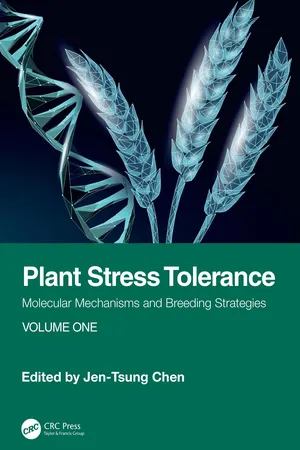
Plant Stress Tolerance
Molecular Mechanisms and Breeding Strategies, Volume One
- 552 pages
- English
- ePUB (mobile friendly)
- Available on iOS & Android
About this book
Plant Stress Tolerance: Molecular Mechanisms and Breeding Strategies, Volume One provides effective ways for organizing precision and sustainable agriculture. The methods include the use of advanced molecular techniques covering multiple omics, high-throughput technology, computational biology, epigenetic manipulation, and CRISPR genome editing. These methods can advance the development of high-yield, high-quality, and stress-resilient crops that meet the requirements for supporting global food and nutrition security.
The book proposes strategies for omics-assisted and speed breeding techniques, exploring molecular mechanisms of plant abiotic stress caused by temperature, drought, salinity, and various pollutants. These are uncovered by quantitative trait loci analysis and mapping, genomic selection, functional genomics, multiple omics, high-throughput sequencing, and high-throughput phenotyping, and are integrated into the various systems of crop improvement.
Plant Stress Tolerance: Molecular Mechanisms and Breeding Strategies, Volume One presents emerging and comprehensive knowledge and is an ideal reference for students, researchers, teachers, and professors. It inspires ideas for investigations in the fields of plant stress physiology, plant functional genomics, plant multiple omics, plant genetic engineering, systems biology, and crop breeding.
Frequently asked questions
- Essential is ideal for learners and professionals who enjoy exploring a wide range of subjects. Access the Essential Library with 800,000+ trusted titles and best-sellers across business, personal growth, and the humanities. Includes unlimited reading time and Standard Read Aloud voice.
- Complete: Perfect for advanced learners and researchers needing full, unrestricted access. Unlock 1.4M+ books across hundreds of subjects, including academic and specialized titles. The Complete Plan also includes advanced features like Premium Read Aloud and Research Assistant.
Please note we cannot support devices running on iOS 13 and Android 7 or earlier. Learn more about using the app.
Information
Table of contents
- Cover
- Half Title
- Title Page
- Copyright Page
- Table of Contents
- Editor
- List of Contributors
- Preface
- Chapter 1 Re-Designing Photosynthesis: Balancing Yield and Stress Tolerance
- Chapter 2 Plant Tolerance to Alkaline Salinity: A Gordian Knot to Untie
- Chapter 3 Metabolic Markers and Metabolite Quantitative Trait Loci (mQTLs) for the Breeding of Crop Quality and Resistance
- Chapter 4 Plants’ Abiotic Stress Responses: Molecular Mechanisms of Stress Tolerance and Breeding Strategies
- Chapter 5 Integration of Artificial Intelligence (AI) and Machine Learning (ML) in Plant Breeding
- Chapter 6 CRISPR-Based Precision Breeding for Crop Improvement: Current Achievements and Future Directions
- Chapter 7 Applications of CRISPR on Improving Plant Growth and Development through Secondary Metabolism
- Chapter 8 Plant Biochemical and Molecular Responses to Extreme Temperature
- Chapter 9 Molecular Mechanisms and Breeding Strategies for Heat Tolerance in Plants: An Update
- Chapter 10 Plant Cold Stress Tolerance: Molecular Mechanisms and Breeding Strategies
- Chapter 11 Challenges of Drought Stress: Unveiling Plant Responses and Approaches to Confer Tolerance
- Chapter 12 Harnessing CRISPR/Cas for Enhanced Drought Tolerance and Sustainable Crop Management
- Chapter 13 Adaptation to Drought Stress in Cereals: A Molecular Perspective
- Chapter 14 Phytohormones Increase Plant Adaptation under Soil and Water Stresses
- Chapter 15 Plant Tolerance Mechanisms to Heavy Metal Stress and Breeding Strategies
- Chapter 16 Reducing the Toxicity of Heavy Metals and Metalloids on Grain Crops by Breeding: Current Achievements on Conventional and Molecular Breeding Approaches
- Chapter 17 Molecular Aspects of Abiotic Stress Tolerance in Horticultural Crops: Challenges and Prospects
- Chapter 18 Brassicaceae: Stress Responses and Breeding Strategies in Unfriendly Environments
- Chapter 19 Mechanisms of Tolerance to Diverse Environmental Stresses and Adaptive Capacity: Current Achievements in Amaranth
- Chapter 20 CRISPR/Cas Technology: A Promising Tool for Enhancing Plant Growth and Development
- Chapter 21 CRISPR Tools for Developing Plant Oxidative Stress Tolerance: Protocols, Current Achievements, and Future Directions
- Chapter 22 Nanoparticle-Enhanced Strategies for Abiotic Stress Tolerance in Plants
- Chapter 23 Nanobiotechnology Approaches for Enhancing Crop Resilience to Salinity Stress
- Index